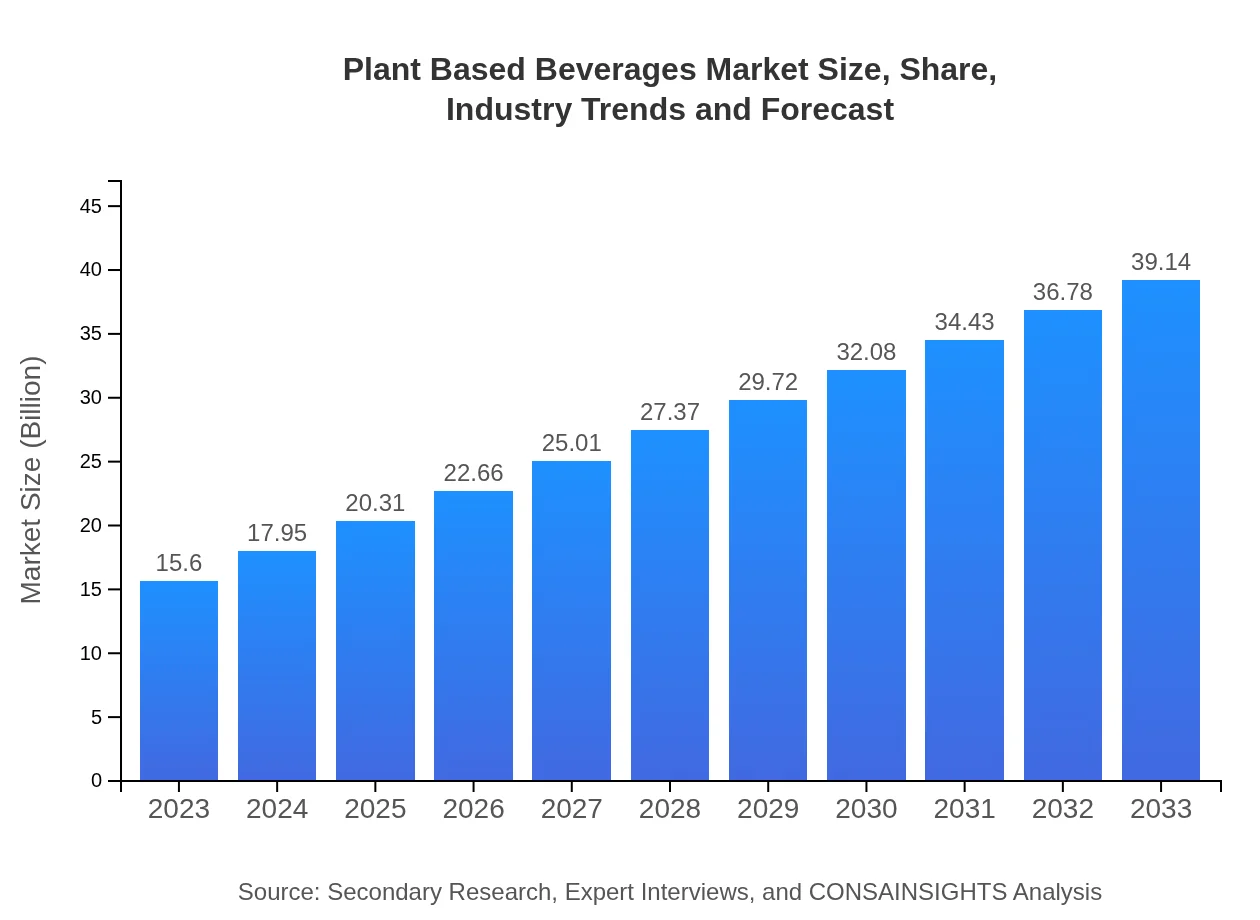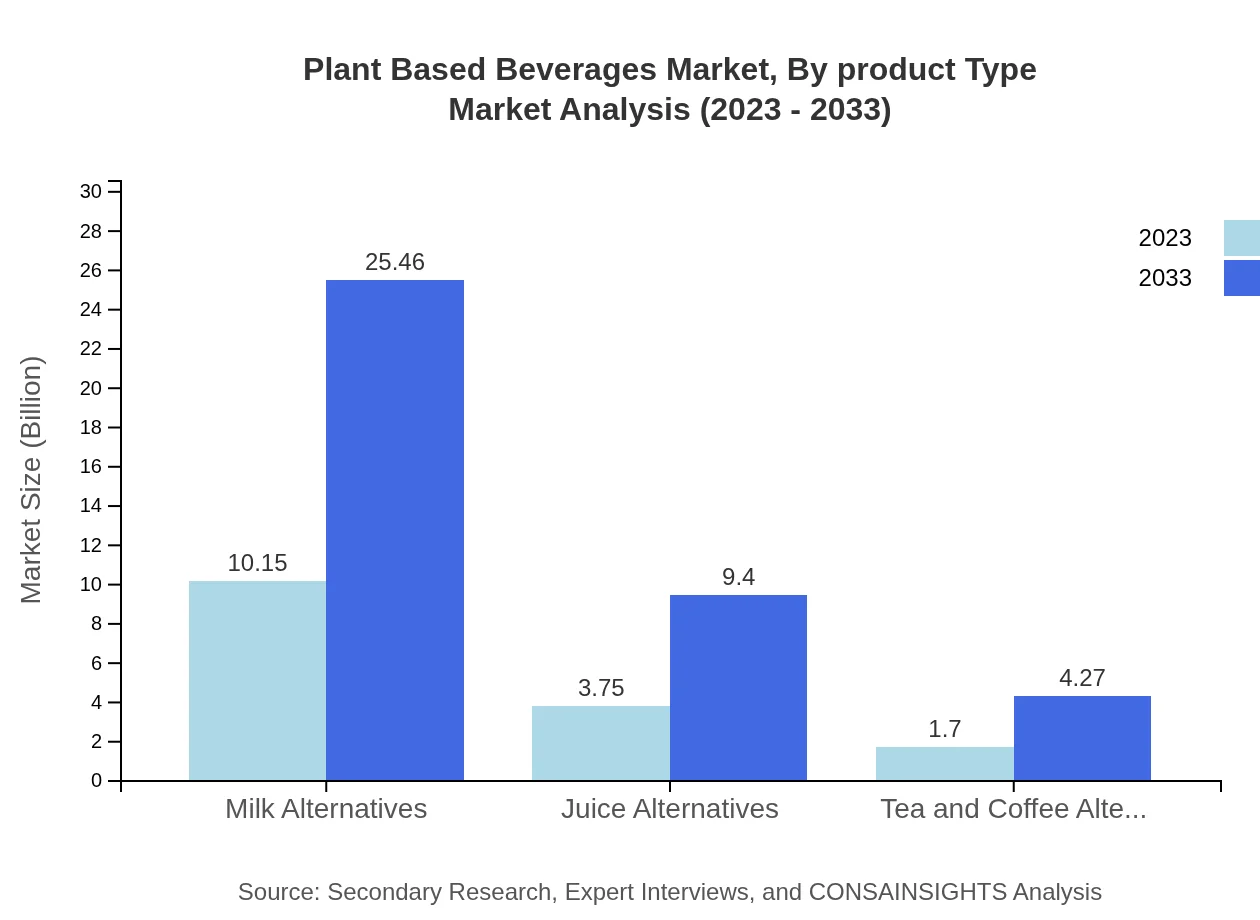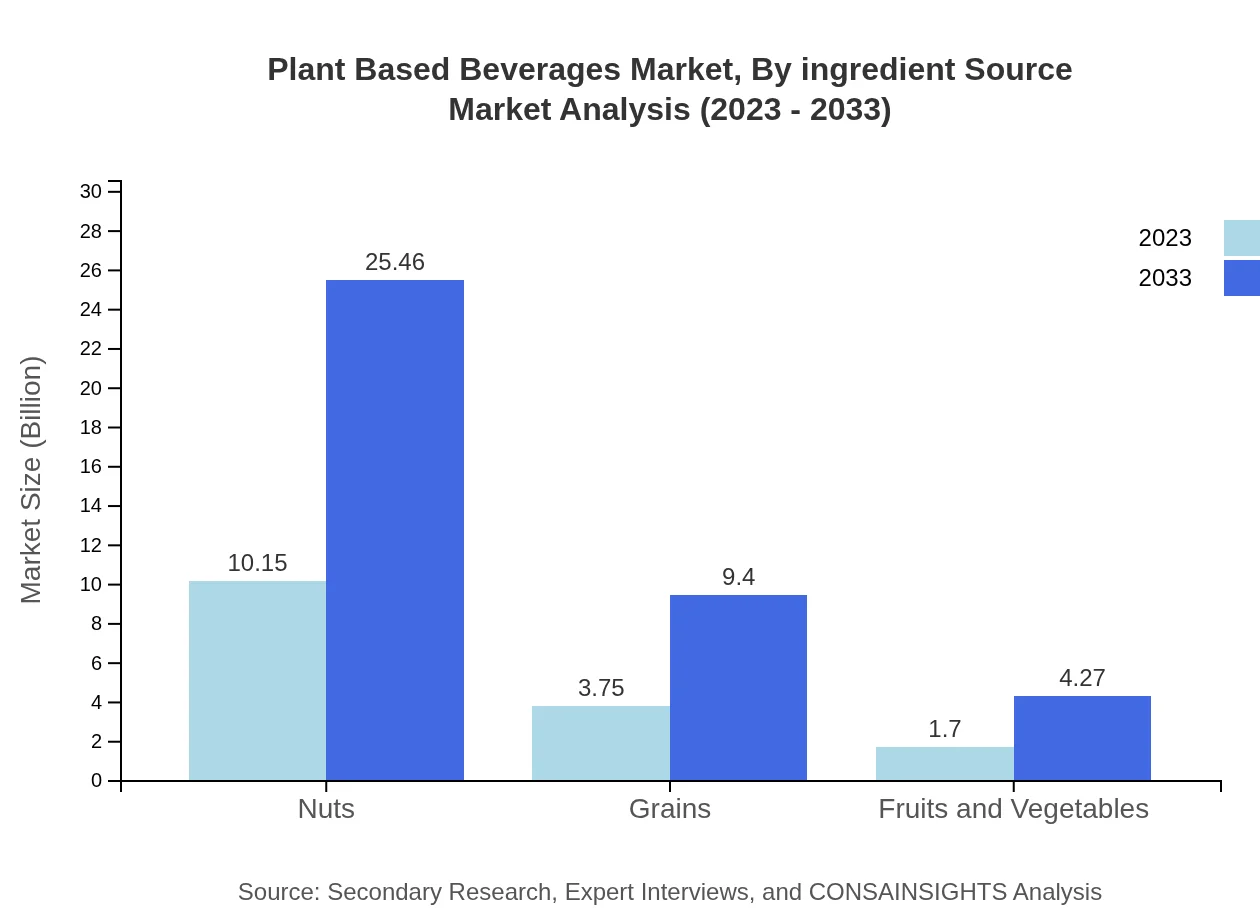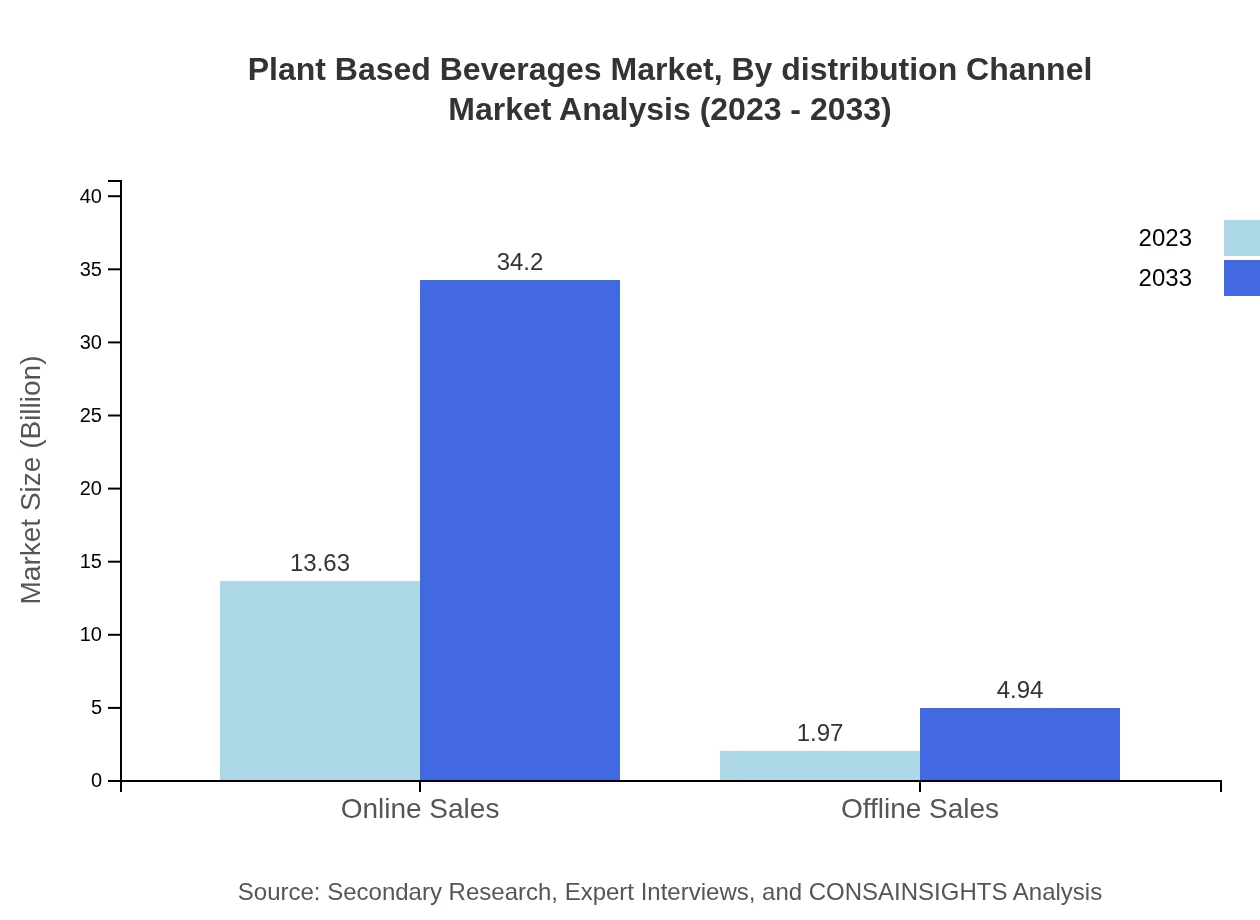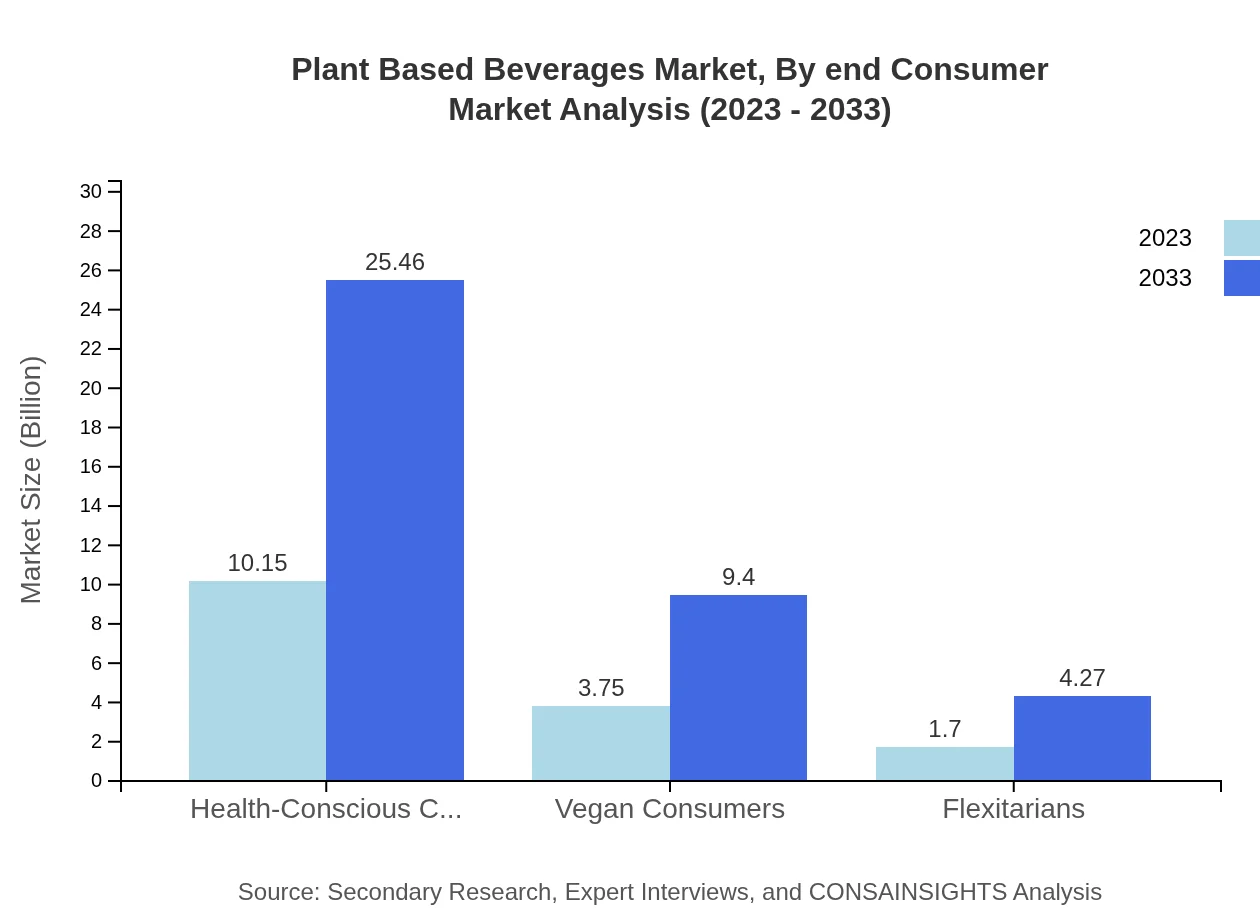Plant Based Beverages Market Report
Published Date: 31 January 2026 | Report Code: plant-based-beverages
Plant Based Beverages Market Size, Share, Industry Trends and Forecast to 2033
This report provides an in-depth analysis of the Plant Based Beverages market, including market size, growth forecasts, trends, and regional insights for the period spanning 2023 to 2033.
| Metric | Value |
|---|---|
| Study Period | 2023 - 2033 |
| 2023 Market Size | $15.60 Billion |
| CAGR (2023-2033) | 9.3% |
| 2033 Market Size | $39.14 Billion |
| Top Companies | Alpro, Oatly, Blue Diamond Growers, Coca-Cola Company |
| Last Modified Date | 31 January 2026 |
Plant Based Beverages Market Overview
Customize Plant Based Beverages Market Report market research report
- ✔ Get in-depth analysis of Plant Based Beverages market size, growth, and forecasts.
- ✔ Understand Plant Based Beverages's regional dynamics and industry-specific trends.
- ✔ Identify potential applications, end-user demand, and growth segments in Plant Based Beverages
What is the Market Size & CAGR of Plant Based Beverages market in 2023?
Plant Based Beverages Industry Analysis
Plant Based Beverages Market Segmentation and Scope
Tell us your focus area and get a customized research report.
Plant Based Beverages Market Analysis Report by Region
Europe Plant Based Beverages Market Report:
The European market for Plant Based Beverages is also set for significant growth, expected to grow from $4.34 billion in 2023 to $10.90 billion in 2033. Europe leads the way with its strong vegan and health-conscious consumer base, influencing the demand for various innovative plant-based beverages.Asia Pacific Plant Based Beverages Market Report:
The Asia Pacific region is witnessing a remarkable surge in the Plant Based Beverages market, expected to grow from $3.07 billion in 2023 to $7.70 billion by 2033. This growth is fueled by urbanization, rising disposable incomes, and shifting dietary preferences among consumers in countries like Australia, China, and India, where health trends are becoming more prominent.North America Plant Based Beverages Market Report:
North America represents a major market for Plant Based Beverages, with sizes projected to rise from $5.66 billion in 2023 to about $14.19 billion by 2033. This region's growth is highly driven by the increasing prevalence of lactose intolerance, dietary shifts toward plant-based diets, and the healthy lifestyle trend among consumers.South America Plant Based Beverages Market Report:
In South America, the Plant Based Beverages market is anticipated to expand from $0.77 billion in 2023 to $1.93 billion by 2033. The growing awareness of plant-based diets among the urban population is a key driving force, along with increasing demand for sustainable food options.Middle East & Africa Plant Based Beverages Market Report:
The Middle East and Africa market is projected to increase from $1.76 billion in 2023 to $4.42 billion by 2033. Factors such as a growing population and increasing awareness of health and wellness diets are expected to drive market growth.Tell us your focus area and get a customized research report.
Plant Based Beverages Market Analysis By Product Type
In 2023, the Milk Alternatives segment is estimated to reach a market size of $10.15 billion, capturing 65.05% of market share, and projected to grow to $25.46 billion by 2033. Juice Alternatives will see growth from $3.75 billion to $9.40 billion during the same period, maintaining a 24.03% share, while Tea and Coffee Alternatives will transition from $1.70 billion to $4.27 billion.
Plant Based Beverages Market Analysis By Ingredient Source
The major ingredient sources include nuts, grains, and fruits & vegetables. The nuts segment leads the market at $10.15 billion (65.05% share) in 2023, projected to reach $25.46 billion by 2033. Grains and Fruits & Vegetables are also significant contributors, with $3.75 billion and $1.70 billion respectively in 2023.
Plant Based Beverages Market Analysis By Distribution Channel
The Plant Based Beverages market distribution is expected to shift towards online sales, which are forecasted to grow from $13.63 billion (87.38% share) in 2023 to $34.20 billion by 2033. Offline sales are also anticipated to grow modestly from $1.97 billion to $4.94 billion.
Plant Based Beverages Market Analysis By End Consumer
Market segmentation by end-consumer includes Health-Conscious Consumers ($10.15 billion, 65.05% share), Vegan Consumers ($3.75 billion, 24.03% share), and Flexitarians ($1.70 billion, 10.92% share). Health-Conscious Consumers' market size is expected to grow significantly to $25.46 billion by 2033.
Plant Based Beverages Market Trends and Future Forecast
Tell us your focus area and get a customized research report.
Global Market Leaders and Top Companies in Plant Based Beverages Industry
Alpro:
A leading brand in the development of plant-based beverages in Europe, Alpro specializes in soy and nut-based drinks, promoting a sustainable lifestyle.Oatly:
Oatly is a well-known brand offering oat-based drinks globally, recognized for its innovative approach and sustainable production methods.Blue Diamond Growers:
This agricultural cooperative is known for its almond-based products and is a major player in the plant-based beverage sector.Coca-Cola Company:
Coca-Cola has invested significantly in the plant-based beverage market, especially with its acquisition of brands like AdeZ and the introduction of functional wellness drinks.We're grateful to work with incredible clients.









FAQs
What is the market size of plant Based beverages?
The plant-based beverages market is valued at $15.6 billion in 2023, with an expected CAGR of 9.3% from 2023 to 2033. This growth indicates a robust demand for alternatives among consumers seeking healthier lifestyle choices.
What are the key market players or companies in the plant Based beverages industry?
Key players in the plant-based beverages market include notable companies such as Oatly Group AB, Whitewave Foods (now part of Danone), and So Delicious Dairy Free, among others, all competing in various beverage segments.
What are the primary factors driving the growth in the plant Based beverages industry?
The rise in health consciousness, a shift towards veganism, and sustainability concerns are primary drivers of growth. Consumers increasingly seek nutritious, environmentally friendly beverage alternatives, fueling the demand for plant-based options.
Which region is the fastest Growing in the plant Based beverages market?
North America is the fastest-growing region in the plant-based beverages market, projected to grow from $5.66 billion in 2023 to $14.19 billion by 2033, fueled by increasing consumer interest in health and sustainability.
Does ConsaInsights provide customized market report data for the plant Based beverages industry?
Yes, ConsaInsights offers tailored market research reports on plant-based beverages, accommodating specific business needs by providing in-depth analyses and insights tailored to client requirements.
What deliverables can I expect from this plant Based beverages market research project?
From this project, expect comprehensive reports detailing market size, trends, competitive analysis, consumer segments, and forecasts, enabling informed strategic decisions to drive your business forward.
What are the market trends of plant Based beverages?
Key market trends include a rise in online sales, diverse product offerings ranging from milk and juice alternatives to nut-based options, and innovative packaging solutions, aligning with consumer preferences for convenience and sustainability.

